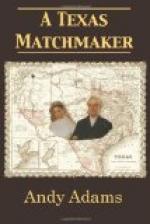As the band struck the eastward or windward line of horsemen, the mares, except for the control of the stallion, would have yielded, but now, under his leadership, they recoiled like a band of ladinos. But every time they approached the line of the closing circle they were checked, and as the cordon closed to less than half a mile in diameter, in spite of the outlaw’s lashings, the manada quieted down and halted. Then we unslung our carbines and rifles and slowly closed in upon the quarry. Several times the mustang stallion came to the outskirts of the band, uttering a single piercing snort, but never exposed himself for a shot. Little by little as we edged in he grew impatient, and finally trotted out boldly as if determined to forsake his harem and rush the line. But the moment he cleared the band Uncle Lance dismounted, and as he knelt the stallion stopped like a statue, gave a single challenging snort, which was answered by a rifle report, and he fell in his tracks.
CHAPTER XX
SHADOWS
Spring was now at hand after an unusually mild winter. With the breaking of the drouth of the summer before there had sprung up all through the encinal and sandy lands an immense crop of weeds, called by the natives margoso, fallow-weed. This plant had thriven all winter, and the cattle had forsaken the best mesquite grazing in the river bottoms to forage on it. The results showed that their instinct was true; for with very rare exceptions every beef on the ranch was fit for the butcher’s block. Truly it was a year of fatness succeeding a lean one. Never during my acquaintance with Las Palomas had I seen the cattle come through a winter in such splendid condition. But now there was no market. Faint rumors reached us of trail herds being put up in near-by counties, and it was known that several large ranches in Nueces County were going to try the experiment of sending their own cattle up the trail. Lack of demand was discouraging to most ranchmen, and our range was glutted with heavy steer cattle.




